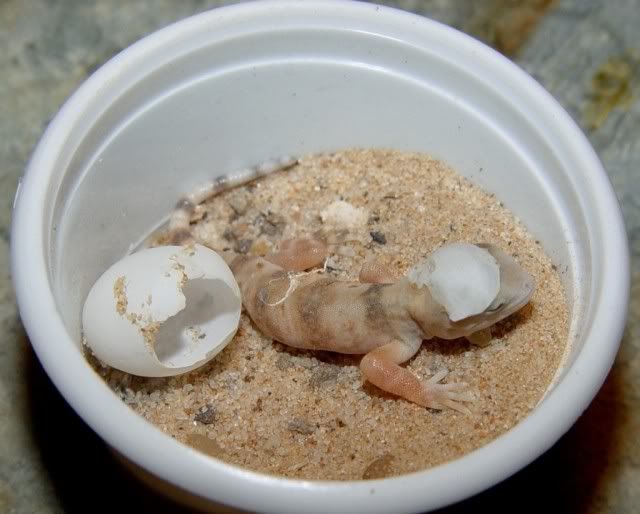WRONG!
HOW??? - if illegal?
These are not CITES listed species. They are not protected by EU treaty. Just rare, like most of the other 900+ species not currently in captivity.
Jon
Yes, they are neither protected by CITES nor by any Eu law. Thus importation is legal.
But I was talking about
exportation.
To my best knowledge, neither Namibia nor South Afrca allows exportation of any wildlife and it is hard to ge an exceptional permit.
Afaik, most of "south african" wildlife legally imported into western countries in fact stems from southern Mozambique -no place for Ptenopus. But OK, who knows If all the animals exported from Mozambique were collected IN Mozambique.....
I also heard rumours about imports from Angola or Botswana, but these were really vague rumours. Do you know more???
However, obviously, you do not see any problem with exportation from Namibia or South Africa. Than please help me: How do I legally get wildlife out of these countries?
I admit that I am absolutely no expert on export and import regulations. Nor I am an expert on african geckos. In fact -if you forget about diverse Tarentola and P. turneri some 20 years ago- my Ptenopus so far were my only excurs into african Gekkonidae.
Also, I am not a proffessional herper or herpetologist. Just an enthusiastic hobbyist with some help from a phD in Biology.
Thus I in fact may be wrong. On the other hand, I did not expect someone with your reputation, Jon Boone, to react such rudely on a few simple, maybe naive, thoughts of someone with at least a bit of experience and knowledge.
I would be so glad to hear, I am wrong with the assumptions I posted above. But If I am, please specify why. That would help me to learn and do better.
So far I was believing, that the regulations I mentioned are one reason, why so few Ptenopus are available in Europe or the US.
Breeding is not easy nor productive? With what degree of confidence ........can you put forth this premature assessment?
Well, till now, I was thinking, if there is a place for sharing even premature thoughts, it might be an internet forum. Sorry, If I was wrong.
But then, I guess, 68% of all forum posts worldwide might better be deleted.
Dumb as I am, from a combination of paperwork and personal experience in this case, I thought, breeding productivity might be in fact an issue limiting wide captive distribution of Ptenopus species.
According to literature, they produce as single egg at not so well known frequency. At least it seems to be seasonally restricted and thus I dared to assume, it never might be productive in captivity.
For reference, I quote a paper to start with:
HIBBITTS Toby J. ; PIANKA Eric R. ; HUEY Raymond B. ; WHITING Martin J. (2005)Ecology of the Common Barking Gecko (Ptenopus garrulus) in Southern Africa. Journal of herpetology, vol. 39, no3, pp. 509-515
Also, since they typically deposit their eggs in a tunnel digged from the tunnel they inhabit, you cannot find eggs without disturbing the animals a lot.
Thus I do not think it is advisable, to dig for eggs too often, which reduces the chance to get eggs for incubation in an incubator.
Or do you know of some trick to finde eggs without interfering with the animals? Please be so kind and tell me.
When it comes to gecko breeding, I by far do not have your experiences, but also am not a newbie. In fact, I bred my first Tarentola in 1973 and saince then had success with quite a number of species.
Breeding is not easy nor productive? With what degree of ........ experience can you put forth this premature assessment?
Coming to Ptenopus, I had a trio of
P. maculatus (or if you want,
P. garrulus maculatus). When I aquired them, they were not in best shape, so I skipped one hibernation to build them up nicely. After relatively cold hibernation in the next winter, the male started calling, but I did not see any signs of gravidity for the females. In late summer I could not resist in digging and found an empty egg shell, but no baby at all. The next year, everything went similar, but I found no egg. Than, the male deceased ( in fact, I killed him by relocating a larger stone in the enclosure :-x) and I was not able to find a replacement. Thus, I traded the females for some Diplodactylus.
Now, Jon, I fully accept that you are much more an expert in Ptenopus biology and legal regulations than I am. But I still have an eye on this genus. Thus, please tell me, how to productively breed Ptenopus and how to find animals legally exportet from their habitat.
What are all the secrets you know? Please do not keep them for ever.
Ingo
P.S.: @ Thorshammri: Did your friend tell you anything about the number of babies he got per pair and year???



